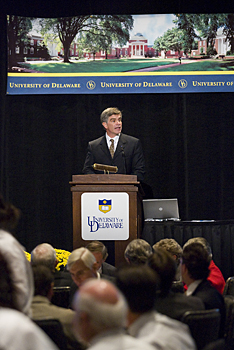
The central Office of Economic Development and Partnership will be designed “to strengthen the University's participation as a partner in economic development,” Harker said.
It will coordinate UD's economic development activity and serve as a point of contact for those in the public and private sectors seeking access to UD's expertise, programs and services.
“Our goal is to promote expanded business and government partnerships and to better support technology transfer and the commercialization of new discoveries,” Harker said.
He also announced the Institute of Business and Economic Research, which will be housed in the Lerner College of Business and Economics. The institute will bring together the expertise of faculty and staff from across the campus to evaluate factors that are key to the promotion of economic growth and business development in Delaware.
The institute will carry out economic forecasting, economic analysis of policy options, provide programs that support statewide business planning and conduct evaluations of relevant and timely economic and business issues.
In addition, Harker said Friday's conference is just the beginning of a series of conference, workshops and sessions designed to promote partnership among academia, business and government. The next major conference will be held March 25, 2008, with the title “Creating a Livable Delaware: Pathways for Enhancing Prosperity and Quality of Life.”
Harker said the initial conference was “both important and historic in its pursuit of new models of partnership among government, industry and higher education.” Such partnerships will be crucial to ensure Delaware is competitive in the global economy throughout the century.
He added that the goal of economic advancement is to make people's lives better, to unleash human potential and to create opportunity for all.
Delaware has a tradition of partnerships and a “can-do” attitude that, added to its intimate size, makes it possible to gets things done. The University has a major role, he said.
“In the decades ahead, I believe the University of Delaware must become even more fully engaged as a public university that educates global citizens and scholars, that creates knowledge and that applies knowledge to the critical needs of the state, the nation and the world.”
UD must mobilize its knowledge resources and do so through expanded partnerships, Harker said. To do that, it must support individual excellence and foster an atmosphere that encourages entrepreneurship.
“It is crucial that we create flexible and adaptive internal arrangements that encourage constellations of faculty and students to focus their creative imagination and energy on areas of scholarship that affect the critical needs of our state and nation,” he said.
New models are required in which the University and its partners collaborate from the outset and commit themselves to a sustained collaboration that supports not only the creation of knowledge but also its application and commercialization, Harker said.
As an example, he mentioned the Delaware Biotechnology Institute, which engages and integrates scientists beyond traditional disciplinary boundaries and has led to the creation of an estimated 12,000 new primary and secondary jobs in the life sciences.
Harker cited the work of UD Provost Dan Rich and a University-wide task force convened earlier this year that looked at the many ways the University contributes to economic development. It also looked at what more could be done, with the conference and the new office and institute among its recommendations.
Article by Neil Thomas
Photo by Kevin Quinlan

